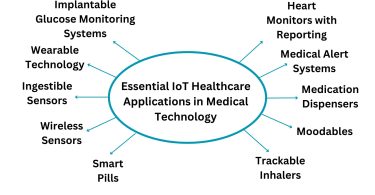More changes are coming, and the healthcare sector will probably undergo a major upheaval by 2024. The swift development of AI and its incorporation into the healthcare system will be a defining feature of the changes, as it will unlock the potential to enhance patient outcomes and healthcare delivery.
We’ll look at five bold predictions for healthcare for the upcoming year, emphasizing how these developments will upend the market, boost productivity, increase patient involvement, and ultimately open the door to a better, more connected future.
Generative AI will assist in coordinating patient and provider needs for better health outcomes:
Generative AI has the potential to completely transform the way healthcare organizations address the ubiquitous problem of patient engagement and maximize operational efficiency. Suboptimal healthcare interactions are caused by a lack of coordination and alignment among different stakeholders in the healthcare system. The weight of administrative responsibilities, which is a major cause of burnout & patient care abandonment in the healthcare industry, makes this worse. The American Medical Association, also known as the AMA, reports that a startling 89% of doctors believe that clinical results may suffer as a result of prior permission delays.
An encouraging remedy is provided by generative AI. With its ability to automate administrative duties and simplify workflows, it will enable healthcare personnel to handle more complex cases and devote more time to providing direct patient care. Furthermore, by providing individualized, clear health information and promoting proactive patient interactions, generative AI will improve patient literacy and participation. Imagine that patient experiences from automated outreach programmes, like flu vaccine reminders, are unmatched and that response rates are astounding. With AI at their disposal, healthcare professionals will be better able to devote more time and knowledge to treatment and diagnosis, ultimately improving patient happiness and care.
AI will lessen friction for payers in the healthcare system:
The importance of AI for medical payer organizations is becoming more and clearer as an election year draws near. Using AI to its full potential will become increasingly important at this time, especially in areas like reward processing where it may simplify processes and close the data gap between administrative and clinical settings. As we get ready for impending regulatory changes, this collaboration effort is crucial to enhancing transparency and the claims experience.
AI copilots will aid in addressing the scarcity of healthcare workers:
Healthcare organizations have long been concerned about ongoing and increasing personnel shortages. AI will save the day in 2024 by giving medical professionals the information and understanding they need to deliver even better treatment. Imagine family careers and community health workers or CHWs equipped with AI copilots to help them provide in-home care. In addition to assisting them, these AI helpers will suggest conversation subjects and give the medical team with the necessary insights.
Transparency in AI is necessary for AI models:
Healthcare AI vendors are going to be under increasing pressure to meet the requirement for AI model transparency as artificial intelligence (AI) and technology become more and more integrated into the industry. This demand is fueled by the expanding number of AI laws. Healthcare companies will place a high priority on monitoring and comprehending how AI models work in order to guarantee correct decision-making, safeguard patient data, and uphold complete accountability and transparency.
The movement for more transparency in AI is essential to fostering confidence and trust in AI-powered healthcare solutions. In the end, improving patient care, it satisfies legal obligations and guarantees that medical personnel have the knowledge necessary to make wise decisions.
Advances in innovation will be fueled by compliance:
Not everything is about AI in the New Year. In fact, healthcare organization’s will begin allocating their IT budgets strategically, putting a priority on projects that guarantee adherence to impending regulations, like those pertaining to prior authorization/denials procedures, the adoption of value-based care models, and payment schemes. This strategy seeks to comply with new standards while improving operational efficiency. It involves finding a balance between budgetary restraints, innovation, and compliance to enable healthcare organizations to improve patient outcomes without upsetting the status quo and alienating employees or customers.
These forecasts highlight how crucial AI will be in transforming the healthcare sector.



